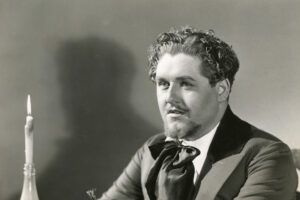

Many composers and writers have taken a stab at this myth of the mermaid who longs to be human. Of all the attempts, Dvorak’s Rusalka might be the crowning glory. He adds a tragic, soulful dimension to the tale. The “Rusalka” motif is a melody that goes upwards, and if the word “hope” could be put into music, it might sound exactly like Rusalka’s motif.
In recent years many prominent opera directors have jumped on the Rusalka train, and the “lake” has been a metaphor about repressed sexual longing in various settings—a mental asylum, an abusive father’s basement, a brothel. By contrast, Otto Schenk’s 1994 production for the Met is unabashedly old-fashioned and literal. The lake is a lake, the palace is a palace, Jezibaba is a Disney-like old crone. When Jezibaba calls on all her creatures to cast her spell, the stage is filled with hopping frogs, crawling alligators, buzzing fireflies, and other critters.
Age has taken some of the shine off the picture-book sets, and the costumes now look downright ratty tatty. But the worst thing about the Schenk set is that it’s acoustically unfriendly. The lake in Acts One and Three is really a pit in the middle of the stage, and it’s like black hole into which all the sound escapes. Singers thus gingerly negotiate themselves away from the lake with varying degrees of success. But still, old-fashioned productions like Schenk’s have their charms.
Rusalka is one of Renée Fleming’s trademark roles. I last heard her about 10 years ago in the role and her voice has held up remarkably well. She now resorts to some glottal attacks on the lower register but the silvery shine is mostly still there. “Song to the Moon” is a beautiful example of Renee’s vocalise at its best. She’s quite aware of all the vocal moments to create, including a final diminuendo as she sinks into the lake forever. It’s certainly pleasing to the ears, but after the awhile the effect is a little flattening, as she’s so careful to not strain her soft-grained soprano in any way.
I also wish that she’d convey more desperation in her portrayal. She does some “ethereal” arm waving movements, and when she’s upset she covers her face with her hands, but that’s as far as the acting goes. She otherwise is careful to stick to her tried-and-true aloof, lady-like characterization. She even wears a very Disney-like blond, flowing wig and daintily trots around the stage in powder-blue spike heels.
The other singers in last night’s revival are not “actors” either, but they’re all more straightforward and less affected. Piotr Beczala is a bit too lyrical for the Prince, but his voice’s sharp edge cuts over the orchestra. He sounds great. He struck a really dashing figure in apparently new costumes, including some stylish red riding boots. The Prince has no big aria of his own to sing, but in the duets he made the Prince a genuinely romantic character, and not simply a feckless lover. Maybe the best part of Beczala’s performance was the curtain calls. He lit up like a Christmas tree at all the applause and bravos. It was quite endearing.
Age has finally taken its toll on Dolora Zajick’s voice. It’s no longer a big, brassy column of sound. The middle is rather curdled, but she can still march onstage, belt out the top and the bottom voice, do the old witch schtick, and the audience goes away happy. More hapless was John Relyea as the Water Gnome. He was saddled with a costume/beard/wig combo that looked like it weighed as much as he did, and what’s more, stage blocking calls for him to constantly sing “under water” and thus in the orchestra pit. He had troubles projecting his voice, but nevertheless sang with sensitivity and style.
The supporting cast were all fine. Emily Magee made her Met debut as the Foreign Princess. She has a big, cutting voice. I can see her eventually moving towards dramatic soprano roles. The three wood sprites (Disella Larusdott, Renee Tatum, and Maya Lahyani) were harmonious, and Gamekeeper (Vladimir Chmelo) and Kitchen Boy (Julie Boulianne) rounded out the cast.
Yannick Nezet-Seguin conducted with sensitivity, careful at all times to never overpower his leading lady. Sometimes he was too indulgent, slowing to a crawl as Fleming finished a verrrrrry slow phrase. I also thought the Czech-folk-inflected dance sounded a bit ponderous. But the actual sound of the orchestra was very fine.
This revival is not perfect, but it’s worth catching in HD, if only for the timeless beauty of Dvorak’s score and the “ageless” beauty of Renée’s face voice.
Photo: Ken Howard/Metropolitan Opera


























Comments